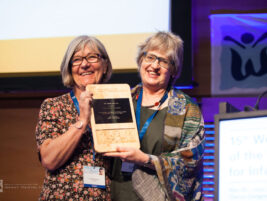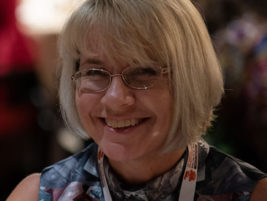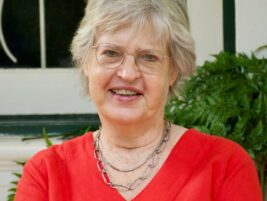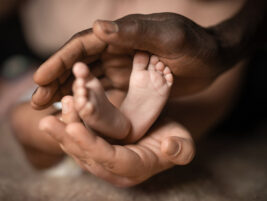Greetings to all WAIMH Affiliates. This brief update has four foci: we offer expressions of gratitude regarding the WAIMH Congress in Edinburgh; we update you on the current structure of the Affiliates Council; provide a brief report on the live reflective supervision pre-congress event; and briefly overview key initiatives that were discussed at the recent bi-annual affiliates council meeting in Edinburgh.
The 14th WAIMH Congress, Edinburgh
Most recently some of us had an opportunity to meet in Edinburgh at the 14th WAIMH Congress. The Congress was an extraordinary event featuring a rich array of infant mental health related practice and research with wonderful opportunities to connect and relax with each other. On behalf of the Affiliates Council we offer a huge thank you to the local organising committee (Jane Barlow, Jonathan Delafield-Butt and Dilys Daws), the WAIMH programme committee (Mark Tomlinson, Kai von Klitzing, Campbell Paul, Jane Barlow, Kaija Puura), the congress secretariat (in Conference Ltd), the WAIMH Board with Minna Sorsa and Leena Kiuru at the WAIMH Office.
Structure of the Affiliates Council
As of June 2014 the WAIMH affiliates Council comprises 57 Affiliate Presidents. Furthermore, at the recent Affiliates Council (AC) bi-annual meeting, held in Edinburgh: Martin St Andre changed his role from AC Chair to AC Past Chair; Maree Foley changed her role within the council from AC representative to AC Chair; and Anna Huber was elected as the AC Representative. Of note, the working descriptions of the role of the AC Chair and Representative were drafted, shared for review and approved via a recent online AC survey.

Thank you to Martin St Andre for his role as Chair of the AC
For the past four years Martin has been the Chair of the AC. When elected by the AC to this role in 2010, not only was the AC a new group within WAIMH, this leadership role was also new. Between 2010 and 2014 Martin developed and shaped this role in response to the voice of the Affiliate Presidents. He has been instrumental in developing an ever growing sense of belonging and purpose to the AC where Affiliate Presidents can voice their successes, challenges and visions for their Affiliates and WAIMH. We are thankful to him for his time and commitment to the AC and delighted that he will remain within the council in a new role: past affiliate council chair.
Maree Foley: From AC Representative to Chair of the AC
Maree was elected by the AC to the role of AC Representative in 2010 and has been active in this role over the past four years. During her term, in conjunction with Martin and the AC, Maree has been shaping and developing this role. Prior to the bi-annual meeting, it was decided (via an online survey with the AC members) that Maree would assume the role of AC Chair for the next term (2014-2018). The primary reason for this decision was to maintain continuity within the ever developing AC.
Maree is from New Zealand. She is the past president of the New Zealand Affiliate, IMHAANZ (Infant Mental Health Association of Aotearoa/New Zealand). She originally trained as a Social Worker, and then trained and practiced for many years as a Child Psychotherapist. More recently she has completed a PhD in Management. Maree currently works as a coach with managers and employees of infant/child and family social services/organisations. Her coaching work: examines different social engagement strategies that managers and employees use in relationship with each other (especially when under stress); and explores these strategies in association with employee experiences and strategies of engaging (and sustaining engagement) with clients.
Introducing Anna Huber: The newly elected Affiliates Council Representative
For the past two and a half years Anna has been a member of the AC. She is the current president of the Australian Association for Infant Mental health Inc (AAIMHI) and has been on the national executive of AAIMHI for the past 6 years. As a result she is familiar with the issues and concerns of the members of the AC. She has a particular interest in the development of communication strategies that function to: connect knowledge of infant mental health (IMH) with IMH colleagues and across disciplines; and provide advocacy within the field for the benefit of infants and their families.
Anna is a psychologist and infant and early childhood mental health practitioner and researcher. She set up and worked as program manager and more recently, part time senior clinician in the Centre for Early Life Matters at Marymead, in Canberra, Australia, but is now shifting to part time private practice. At the same time she continues working on her PhD, researching the effectiveness of the Circle of Security Intervention. In turn, Anna brings to her new role on the AC experience and expertise in the fields of IMH, governance, policy development and organisational development.
In her role as AC representative she is keen to continue the work of the AC by further developing ways for affiliates to get to know each other; and to understand the challenges, strengths and interests of the AC members as they work towards the goals and aspirations of WAIMH.
AC Past Chair: Martin StAndré
The AC Past Chair role is a new within the AC. It has been developed so as to provide continuity to the workings of the AC. In this role, Martin will provide consultation and advice to the AC as needed as we work together to address the needs of the Council Presidents and their respective affiliates.
Live Reflective Supervision: A pre-congress event
Reflective Supervision is a cornerstone for enhancing a practitioner’s effective work with infants, very young children and their families. It aims to actively support relationship-based practice with infants and their families. In so doing, reflective supervision focuses on: the shared exploration of the emotional content of infant and family work as expressed in relationships between parents and infants, parents and practitioners, and supervisors and practitioners (Weatherston & Barron, 2009, p. 63).
Reflecting the centrality of reflective supervision to infant mental health practice, a Live Reflective Supervision pre-congress event was conducted prior to the 14th WAIMH Congress at Edinburgh. As a response to past survey regarding the educational needs expressed throughout the Affiliates community, this event was collaboratively organised by the Affiliates Council and the local organising committee (LOC). The event was planned to occur across two live supervision sessions of one and a quarter hours in length, and the aim was to pair up supervisor and supervisee from different continents.
Following an open invitation to colleagues, across the affiliates to consider participating in this event as a supervisor or as a supervisee the following senior practitioners volunteered to be a part of this event: Louise Emanuel (UK), Pamela Segel (New Mexico, USA), Patricia O’Rourke (Adelaide, Australia), Sarah Jones (Melbourne, Australia) and Kalle Brisch (Germany). Unfortunately due to unforeseen circumstances, Pamela was not able to be present at the event, but her input into shaping and developing the event structure was invaluable.
On the day of the event, the seminar room was filled with 300 plus delegates. In the first session, Patricia was in the role of supervisee and Kalle in the role of supervisor. The room became quiet and attentive as the supervision dyad entered seamlessly into a live supervision session. Patricia presented material from the beginning stages of relationship building between herself, and a mum with her baby. Patricia authentically reflected on her experiences of engaging. She reported feeling hope combined with potent experiences of hopelessness and frustration as she engaged with the mother, as a pathway to support her in her relationship with her baby. These reflections were met with Kalle’s active patient attuned listening. Collectively, this dance of reflection highlighted the mothers emerging experience of being helped in her relationship with Patricia which in turn highlighted her possible experience of her baby.
In the second session, Sarah was in the role of supervisee and Louise in the role of supervisor. As in the morning, the room became quiet and attentive as the supervision dyad entered into a live supervision session. Sarah presented material from some sessions that included a mother and a father and their son, a toddler. The couple had recently separated and their young son was communicating to them that he was struggling with his new experience of family. As with Patricia, Sarah authentically reflected on her experiences of engaging with this family. She described her direct therapeutic engagement with the infant allowing his distress to be witnessed in the room. She also described how she worked with the parents to help their son through his loss of experience of family. Louise provided a depth of listening and attending to Sarah, and detailed attention to the clinical material, that further deepened Sarah’s capacity to explore the experiences of the individuals, and their various relationships within the family. The reflective relationship between Louise and Sarah highlighted ways that the parents could provide the conditions within which the security of their son could be repaired and re-built.
Both of these live sessions variously highlighted the centrality of reflective supervision as a form of knowing via being, before doing, in infant mental health practice. They add further support to the practice of reflective supervision as a practice, irrespective of whether we are new or well established within the field.
As a way to continue this initiative, we invite you to share your experiences of reflective supervision; as supervisee and supervisee, with us at Perspectives; and or through the Affiliates Council. Collectively our experiences will further grow and establish reflective supervision as a cornerstone of our practice, within our practice and in our organisations.
Affiliates Council Bi-Annual Meeting
While a full set of notes regarding the Affiliates Council bi-annual meeting will be sent to all Affiliate Presidents, two issues are featured below.
First, the issue of social media, raised in Cape Town remains an ongoing and developing issue. The WAIMH Board have invested much time and expertise in furthering developing the overall use of social media within the organisation. The affiliates are central participants in this social media project and members within the affiliates who have any expertise and or willingness to develop expertise in this area are invited to volunteer a bit of their time in the service of this project.
Second, a core task of the AC involves identifying and meeting the needs of affiliates at varying stages of their development. For example, the Board have suggested that new groups who as yet do not meet the criteria to become an affiliate, but who are in the process of developing their membership will be able to be part of WAIMH as a “study group”. This initiative provides emergent groups with an identity within WAIMH as they develop into an affiliate. It also creates a pathway for new groups and more established groups within the AC to get to know each other.



References
Weatherston, D. & Barron, C. (2009). What does a reflective supervisory relationship look like? In S. Heller & L. Gilkerson (Eds.), A practical guide to reflective supervision. Washington, D.C.: Zero to Three Press.
Authors
Foley, Maree,
Chair of the Affiliates Council,
Wellington, New Zealand,
maree.foley@xtra.co.nz
Huber, Anna,
Affiliate Council Representative,
Canberra, Australia,
annahuber.marymead@gmail.com








